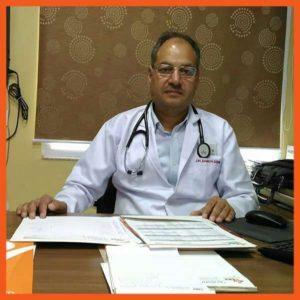Why Heart Attack in Women is More Common?
- According to a recent study, heart attacks are generally more severe in women than men. Researchers found that heart attack has decreased among other adults, but it’s risen significantly among women of age 35-54. A heart attack is more complicated for a woman. The reason might be untreated risk factors like diabetes and high blood pressure. Sometimes women cannot take care of her.
Heart Attack Symptoms in Women
Although heart stroke is the leading cause of death for both men and women, its occurrence chances are higher among women. So it’s just essential for women of every age to recognize the signs of heart attacks and seek immediate medication.
Most people find pain in their chest or discomfort as the primary symptom of a heart attack. Some signs of a heart attack are:
- ● Pain or discomfort in the upper body parts like back, neck, jaw, arms, or stomach.
- ● Shortness of breath
- ● Lightheadedness
- ● Cold sweats
- Fatigue
- ● Vomiting or Nausea
Heart Attack Risk Factors for Women
- ● Diabetes
Women are more prone to go through heart disease than men having diabetes. The reason is diabetes can change the way women feel pain; there’s more risk of a silent heart attack.
- ● High Blood Pressure
Women can gain high blood pressure by consuming birth control pills during pregnancy. All women aged above 65 are more likely to face high blood pressure.
- ● High Cholesterol
Estrogen finds to save women against unhealthy levels of cholesterol. But after menopause, the estrogen levels drop, and chances of high cholesterol occur more.
- ● Smoking
Although men are slightly more likely to smoke, smoking is a greater risk of heart disease in women than men.
- ● Inflammatory Diseases
Rheumatoid arthritis, lupus, or other inflammatory conditions can increase the risk of heart disease in women and men.
- ● Emotional Stress and Depression
Stress is the primary cause that increases the chances of affecting the heart. Depression makes it difficult for a person to maintain a healthy lifestyle or follow recommended treatment for other health conditions.
- ● Physical Activity
Lack of exercise or physical activity is a significant risk factor for heart disease.
Women of all ages have to care about heart diseases seriously. Women under age 65, especially those who have a family history of early heart disease, must pay close attention to heart-related risk factors.
Do Hormones Affect your Risk of Heart Attack?
During pregnancy, women use prescription hormone drugs for birth control or for reducing symptoms of menopause. Could these drugs give a solution to your heart health?
Birth control pills increase the risk of a blood clot in the heart or legs or increase blood pressure. So if you are experiencing the complication of high blood pressure or clotting problems, then some another type of contraception is better for you. But for young women, birth control medications are safe.
As suggested, women aged above 50 are at an increased chance of heart disease and should altogether avoid estrogen and progesterone drugs. And you should opt for hormone replacement therapy if your overall risk of heart attack is shallow and you need rest from hot flashes or other postmenopausal symptoms.
But avoid all this after the age of 65 because the therapy can increase the heart disease risk and potentially leads to breast cancer among women.
How to Prevent Early Heart Attack?
Although some risk factors are not under your control, there are various things you can do to protect your heart health. And it’s estimated that 80% of heart diseases, including heart attacks and strokes, can be safe through lifestyle changes such as:
- ● Maintain a Healthy Diet
The significant chance of increasing the heart rate is being overweight or obese. Eat a healthy diet like whole grains, fruits, and vegetables, low-fat or fat-free dairy products. Avoid saturated trans fats, added sugars, or high amounts of salt as much as possible.
- ● Exercise Regularly
Avoid processed foods and excess sugar or make your routine of doing exercise daily, which will help you lose even a few pounds if you are overweight. A consistent workout routine can boost your heart health.
- ● Reduce Alcohol
Women should take alcohol in limited consumption. For healthy people, that means up to one drink a day and up to two drinks a day for women.
- ● Manage Stress
Stress and depression is the apparent reason for more heart disease. The stress can cause the arteries to tighten, which can increase the risk of heart disease. Try to indulge yourself in positive surroundings, do more exercise, practice mindfulness, or connect in support groups.
- ● Get an Annual Checkup
Heart disease can be challenging to predict, especially when you don’t find any symptoms. Getting an annual checkup is the best way to stay aware of the risk factors and get timely help for conditions related to heart diseases like diabetes and high blood pressure.
Exercise for Heart Health
To maintain your heart health:
1. Exercise daily for approximately 30 minutes. Exercising daily is also a healthy habit to keep your heart healthy.
2. Start gradually and build up your routine by giving at least 5 minutes a day.
3. Start doing strength training exercises at least two days a week.
Having Aspirin to Prevent Heart Disease in Women
If you had a heart attack, your health care specialist would suggest you to take a low-dose aspirin every day to help prevent another attack. But consuming aspirin can increase the risk of bleeding. Some guidelines even said that people aged 60 or above without knowing heart or blood vessel disease should not opt for daily aspirin to prevent a first-time heart attack.Aspirin instructions for the primary prevention of heart attacks are different. Please talk with one of our heart specialists at CKS Hospitals. CKS is one of the best heart & cardiology hospital in Jaipur. For more information, you can call us or visit our hospital. We are open 24/7.
Recent Posts
- All Posts
- Blog


Read More
Our Speciality
- Cardiology & Cardiac Surgery
- Neurosurgery
- Orthopedics & Joint Replacement
- Urology
- Gastroenterology
- Nephrology & Dialysis
- Bariatric & Metabolic Surgery
- ENT & Head Face Neck Surgery
- Internal Medicine & Critical Care
Explore More
Our Doctors

Dr Prakash Chandwani
(Chief Managing Director) Director & Head Dept of Cardiology

Dr Mahesh Goyal
Director & Head Dept of Allergy Specialist, Asthma & Sleep

Dr Mohammed Sharif
CEO & Global Operations

Dr Ghanshyam Agrawal
Consultant Dept of Neuro Surgeon

Dr Sumit Kamble
Consultant Dept of Neurology
See All Doctors
